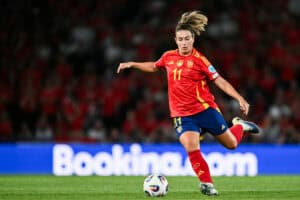South Africa's fencing star had her Olympic dream shattered in 2016 by qualifying criteria. Four years on, she's ready to soar.

Four years ago, Juliana Barrett’s dream of competing at the Olympic Games was shattered by restrictive qualifying criteria, and she was left to contemplate her future while trying to pick up the pieces.
Now, six months out from the Tokyo Games, the 25-year-old fencer is back en garde, and though she has a battle on her hands, a competitive spirit has been reignited within the national champion.
“It can be easy to overthink thinks as a fencer, but my attitude has changed a lot purely through maturity,” Barrett said this week, before embarking on her 2020 season.
Born in Texas to an American mother and a South African father, a young Barrett was introduced to fencing after breaking her leg at the age of eight and taking up the sport to assist in building the muscle she had lost while being confined to a wheelchair.
Though she spent much of her childhood with her mother, Karen Barrett, it was her father Chris Mostert who would ultimately become the more hands-on parent in her chosen sport and he remains an active fencing administrator in Gauteng.
Mostert’s involvement also resulted in Barrett’s decision to represent South Africa at international level, rather than turning out for the United States, as she carries dual citizenship.
As a teenager, while attending the Dwight School in New York City, Barrett represented the SA senior team for the first time, and after receiving her high school diploma she went on to graduate from Northwestern University in 2016 where she majored in political science.
Having juggled her university studies with training and competition in an attempt to qualify for the Rio Olympics, Barrett was left emotionally gutted after being omitted from the national team for the showpiece.
Though she achieved the international criteria to participate at the Games, she did not fulfil the more stringent domestic criteria, and she later sued the SA Sports Confederation and Olympic Committee (Sascoc) and the SA Amateur Fencing Association, claiming their failure to turn down her invitation to the Games had denied her an opportunity to appeal the decision.
With Barrett joining various other federations and individuals in challenging Sascoc’s decision to block athletes from qualifying for the Olympics at African Championship events, the pressure placed on the governing body ultimately resulted in a recent turnaround, opening the door for continental qualifiers to this year’s Tokyo Games.
It has been a long road for Barrett, but she recalls the aspects of fencing which attracted her to the sport in the first place, and she is as hungry as ever.
“In most sports you’re either competing as a team or against yourself, but in fencing you truly have to react to another person, so it opens up the variables of what could happen and what you have to be ready for, both mentally and physically,” she says, as she shares her passion for the intricacies of the discipline.
Residing in New York, where she works on the innovation team for global insurance giant MetLife, Barrett has been relatively inactive on the international circuit in recent years, opting instead to focus on South African competitions in order to boost her ranking and ensure her spot at the Olympic qualifying tournament in Cairo in April.
Having cemented her place as the top-ranked epee women’s fencer in the country, Barrett now hopes to sharpen up at international level, and she starts her 2020 campaign at the World Cup season opener in Havana this weekend.
Though she admits she is not in her best physical shape, Barrett believes she will be fit and ready for the qualifying tournament in Cairo.
And with the experience of securing multiple African Championships medals throughout her career, the SA No 1 is confident she still has what it takes to achieve her Olympic dream.
“I have confidence now, and I have experience,” she says.
“I think this will make up for the physical aspects at which I might not currently be able to match my peers.
“I still have the skills I need and I feel really good about my chances.”
For more sport your way, download The Citizen’s app for iOS and Android.
Support Local Journalism
Add The Citizen as a Preferred Source on Google and follow us on Google News to see more of our trusted reporting in Google News and Top Stories.








